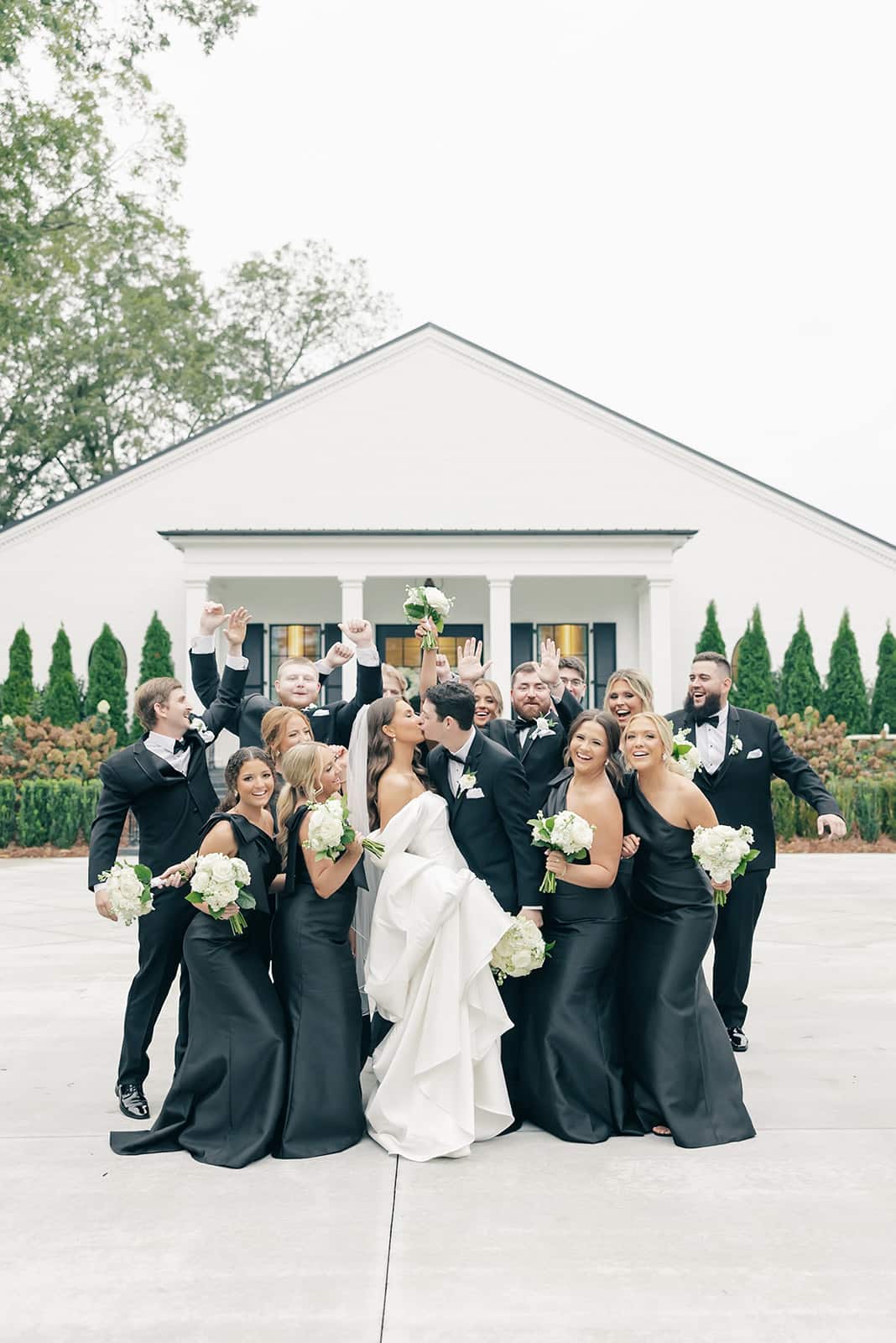Planning a wedding can feel overwhelming, but with the right timeline and systematic approach, you can create your dream celebration without the stress. This comprehensive 12-month wedding planning timeline breaks down everything you need to do, when to do it, and how to stay organized throughout your engagement journey.

Why a 12-Month Timeline Works Best
The Sweet Spot for Wedding Planning
A 12-month engagement period provides the perfect balance between having enough time to plan thoughtfully and maintaining momentum without losing excitement. This timeline allows you to:
- Secure your preferred vendors without rushing decisions
- Take advantage of seasonal pricing and availability
- Spread costs across multiple months for better budget management
- Avoid last-minute stress that can overshadow your joy
- Make thoughtful decisions rather than settling for available options
Benefits of Following a Structured Timeline
Research shows that couples who follow a structured timeline report 40% less wedding planning stress and 60% higher satisfaction with their final celebration. A well-organized approach ensures nothing falls through the cracks while keeping you focused on what matters most.

Months 12-10: Foundation Phase
Month 12: Setting the Stage
Celebrate Your Engagement
Your engagement is a milestone worth celebrating properly. Start by announcing your engagement to family and friends, then take engagement photos that can be used for announcements and your wedding website. This is also the perfect time to create a shared wedding planning folder or app account that both of you can access. Don’t forget to set your wedding date and confirm availability with your chosen venue.
Establish Your Vision
- Dream together: Discuss your ideal wedding vision as a couple
- Set priorities: Identify your top 3 must-haves (photography, live music, specific decor, etc.)
- Research inspiration: Create Pinterest boards and collect ideas
- Consider guest count: Develop preliminary guest list estimates
- Define your style: Classic, modern, rustic, or bohemian aesthetic
- Discuss non-negotiables: Elements that are absolutely essential to both of you
Budget Planning Foundations
- Determine total budget: Include contributions from both families
- Research average costs: Understand typical vendor pricing in your area
- Open wedding savings account: Start dedicated wedding fund
- Create budget spreadsheet: Track planned vs. actual expenses
- Allocate emergency fund: Set aside 5-10% for unexpected costs
- Establish payment timeline: Plan when major payments will be due
- Consider financing options: Credit cards with rewards or personal loans if needed
Month 11: Major Decisions
Photography and Videography Priority
Securing the right photographer is crucial since good photographers book up quickly for popular wedding dates. Research photographers by reviewing portfolios and meeting potential candidates in person to ensure personality fit. Once you’ve found your preferred professionals, book them immediately with a deposit. Take time to discuss shot lists and share any must-have photos or family dynamics they should know about. Schedule your engagement session early, as these photos will be needed for save-the-date cards.
Guest List Development
Creating your guest list requires both heart and strategy. Start by making a master list that includes everyone you’d love to invite if budget and space weren’t considerations. Then prioritize guests into must-invite versus nice-to-invite categories, ensuring your final count works with your venue capacity. Begin collecting current addresses for everyone on your list, as outdated addresses can cause invitation delays later.
Initial Vendor Outreach
- Caterer research: Get recommendations and schedule initial consultations
- Music planning: Decide between DJ, band, or mixed approach
- Transportation logistics: Consider guest shuttle services or special transportation needs
Month 10: Building Your Team
Essential Vendor Booking
- Caterer selection: Research and book catering services
- Music planning: Decide between DJ, band, or mixed approach
- Transportation needs: Consider guest shuttle services or special transportation
- Wedding planner consultation: Decide if you need professional planning support
Service Provider Research
- Officiant selection: Research religious leaders or secular officiants
- Florist consultations: Meet with florists and discuss seasonal options
- Rental company research: Tables, chairs, linens, and specialty items
- Specialty services: Photo booths, lighting, or entertainment additions

Months 9-7: Detail Development Phase
Month 9: Design and Style
Wedding Theme and Colors
- Finalize color palette: Choose 2-3 main colors plus accent shades
- Select wedding theme: Rustic, classic, modern, bohemian, etc.
- Design save-the-dates: Create and order save-the-date cards
- Wedding website creation: Build site with details, registry, and FAQ
Attire Shopping Begins
- Wedding dress shopping: Schedule appointments at 3-4 bridal salons
- Groom’s attire planning: Decide on tuxedo rental or purchase
- Bridesmaid dress selection: Choose style and color for wedding party
- Accessory brainstorming: Consider shoes, jewelry, and undergarments
Month 8: Service Providers
Ceremony and Reception Services
- Book your officiant: Secure religious leader or secular officiant
- Florist selection: Choose florist and discuss seasonal options
- Cake tastings: Schedule tastings with 2-3 bakeries or cake designers
- Finalize rental needs: Confirm tables, chairs, linens, and specialty items
Beauty and Wellness
- Hair and makeup trials: Test looks with potential beauty professionals
- Spa services planning: Consider pre-wedding massage or facial packages
- Fitness goals: Establish realistic health and wellness timeline
- Skin care routine: Start consistent regimen for clear complexion
Month 7: Legal and Practical Matters
Legal Requirements
Understanding the legal aspects of marriage early prevents last-minute scrambling. Research your state’s marriage license requirements, including timing, required documents, and waiting periods. Decide whether either partner will change their name after marriage, as this affects everything from travel documents to professional licenses. Review your insurance policies including health, auto, and renter’s or homeowner’s coverage to understand how marriage will affect your benefits and coverage options.
Registry and Travel Planning
- Wedding registry creation: Register at 2-3 stores with various price points
- Honeymoon destination research: Begin exploring options and pricing
- Guest hotel coordination: Research accommodation options for traveling guests
- Welcome bag brainstorming: Consider gifts and local treats for out-of-town visitors
- Travel document check: Ensure passports are current for honeymoon travel

Months 6-4: Finalization Phase
Month 6: Invitations and Details
Wedding Invitations
- Finalize guest list: Make final cuts to fit capacity and budget
- Order invitations: Include RSVP cards, reception cards, and directions
- Addressing strategy: Decide on calligraphy, printing, or handwriting
- Postage planning: Purchase stamps and plan mailing date
Menu and Bar Planning
- Finalize catering menu: Complete tastings and select final dishes
- Bar service decisions: Open bar, wine and beer only, or cash bar
- Dietary accommodations: Plan for vegetarian, vegan, and allergy options
- Late-night snack planning: Consider additional food service for reception
Month 5: Program and Ceremony Planning
Ceremony Structure
- Write personal vows: If choosing personal vows over traditional
- Plan ceremony music: Select processional, recessional, and special songs
- Unity ceremony planning: Candle lighting, sand ceremony, or other rituals
- Program design: Create ceremony programs with order of service
Reception Entertainment
- First dance selection: Choose and practice your special song
- Reception playlist: Provide must-play and do-not-play lists to DJ/band
- Special dances: Plan parent dances and anniversary dance
- Entertainment additions: Photo booth, games, or special performances
Month 4: Beauty and Attire Finalization
Final Dress Details
- Final dress fitting: Schedule alterations completion date
- Shoe breaking-in: Wear wedding shoes around the house to avoid blisters
- Undergarment selection: Ensure proper fit with wedding dress
- Groom’s final fitting: Complete tuxedo or suit measurements
Beauty Preparations
- Final hair and makeup trial: Test complete look with accessories
- Nail appointment scheduling: Book manicure and pedicure for week of wedding
- Teeth whitening: Complete any dental work or whitening treatments
- Eyebrow shaping: Schedule professional shaping 1-2 weeks before wedding
Months 3-1: Final Preparations
Month 3: Vendor Confirmations
Timeline Creation
- Detailed day-of timeline: Create minute-by-minute schedule for vendors
- Vendor contact sheet: Compile all vendor contact information
- Payment schedule review: Confirm final payment dates and amounts
- Backup plan development: Weather contingencies for outdoor elements
Guest Management
- Send invitations: Mail 6-8 weeks before wedding date
- Track RSVPs: Create system for managing responses
- Seating chart planning: Begin grouping guests for reception seating
- Special accommodation arrangements: Assist elderly or disabled guests
Month 2: Final Details
Ceremony Rehearsal Planning
- Schedule rehearsal: Typically the evening before the wedding
- Rehearsal dinner arrangements: Plan location and guest list
- Marriage license: Obtain license according to your state’s timing requirements
- Final headcount: Confirm numbers with caterer and other vendors
Day-of Logistics
- Emergency kit assembly: Band-aids, stain remover, sewing kit, medications
- Vendor tip envelopes: Prepare cash tips for wedding day team
- Photography shot list: Final family photo groupings and special requests
- Transportation arrangements: Confirm all pickup times and locations
Month 1: Week-of Wedding
Final Vendor Communications
- Confirm all vendors: Final headcount, timeline, and special requests
- Rehearsal attendance: Confirm all wedding party and family participation
- Seating chart finalization: Complete guest seating arrangements
- Welcome bag assembly: Prepare gifts for out-of-town guests
Personal Preparations
- Delegate responsibilities: Assign day-of tasks to reliable friends and family
- Pack honeymoon: Complete packing and confirm travel arrangements
- Self-care focus: Maintain sleep schedule, hydration, and stress management
- Enjoy the moment: Remember to savor these final days of engagement
Managing Timeline Challenges
Common Obstacles and Solutions
Vendor Availability Issues
When your preferred vendor is unavailable for your date, don’t panic. Consider alternative recommendations from unavailable vendors for referrals, explore package deals where some vendors offer discounts for multiple services, maintain flexibility in services by adapting your vision to available professionals, and remember that early booking provides significant advantages since popular vendors book up quickly.
Budget Overruns
Financial stress can quickly overshadow wedding joy, but there are strategic ways to manage costs without sacrificing your vision. Start by prioritizing your must-haves and cutting nice-to-have items first. Many vendors are willing to negotiate payment plans or adjust packages to fit your budget, so don’t hesitate to have honest conversations about costs. Consider which elements you can handle yourself through DIY projects, and remember that reducing your guest list significantly impacts per-person costs across catering, favors, and stationery.
Family Dynamics and Disagreements
- Boundary setting: Clearly communicate your vision and decision-making process early
- Regular communication: Keep family informed with monthly updates about major decisions
- Strategic compromise: Choose which battles are worth fighting and find win-win solutions
- Professional mediation: Consider hiring a wedding planner for neutral perspective
- Respect differences: Acknowledge that family members may have different priorities
- Stay united: Present decisions as a couple to avoid manipulation or pressure tactics
Staying Organized Throughout Your Timeline
Digital Organization Tools
Planning Apps and Software
- Comprehensive planning apps: The Knot, WeddingWire, or Zola planning tools
- Budget tracking: Mint, YNAB, or dedicated wedding budget apps
- Timeline management: Google Calendar or specialized wedding timeline apps
- Communication platforms: WhatsApp groups or wedding party communication apps
Physical Organization Systems
- Wedding binder: Divided sections for contracts, inspiration, and contacts
- Sample collection: Fabric swatches, invitation samples, and color references
- Important document folder: Contracts, insurance policies, and legal documents
- Inspiration board: Physical mood board for quick visual reference
Communication Strategies
Vendor Relationship Management
Maintain positive relationships with all vendors through:
- Regular check-ins: Monthly status updates leading up to the wedding
- Clear expectations: Written communication about specific needs and preferences
- Payment punctuality: Honor all payment schedules and contract terms
- Appreciation expression: Thank vendors for exceptional service and flexibility
Family and Wedding Party Communication
Keep everyone informed and engaged:
- Monthly updates: Share progress and upcoming decisions
- Clear role expectations: Define responsibilities for wedding party members
- Decision-making transparency: Explain how and when major decisions are made
- Appreciation gestures: Thank helpers with small gifts or personal notes

Making Your Timeline Work for You
Customizing Your Planning Schedule
Remember that this timeline serves as a guideline, not a rigid rule. Some couples may need to adjust based on:
- Peak season weddings: Book vendors 15-18 months in advance for popular dates
- Holiday weekend celebrations: Increase guest accommodation and travel planning time
- Cultural or religious requirements: Allow additional time for specific ceremony elements
- Personal circumstances: Work schedules, family situations, or health considerations
Maintaining Perspective Throughout Planning
The key to successful wedding planning lies not in perfect adherence to any timeline, but in consistent progress toward your shared vision. Use this 12-month framework as your foundation, then adapt it to fit your unique circumstances, preferences, and style.
Your wedding planning journey should enhance your relationship, not strain it. Stay focused on the celebration of your love, maintain open communication with each other, and remember that the most important element of your wedding day is the commitment you’re making to each other. Everything else is simply beautiful decoration around that central, joyful truth.
Final Timeline Success Tips
- Start with the big decisions: Photography, catering, and music are often the most challenging to secure
- Build in buffer time: Add extra weeks for major decisions in case your first choice isn’t available
- Delegate when possible: Accept help from family and friends who offer assistance
- Document everything: Keep contracts, emails, and important details organized and accessible
- Celebrate milestones: Acknowledge progress and enjoy the planning process together








